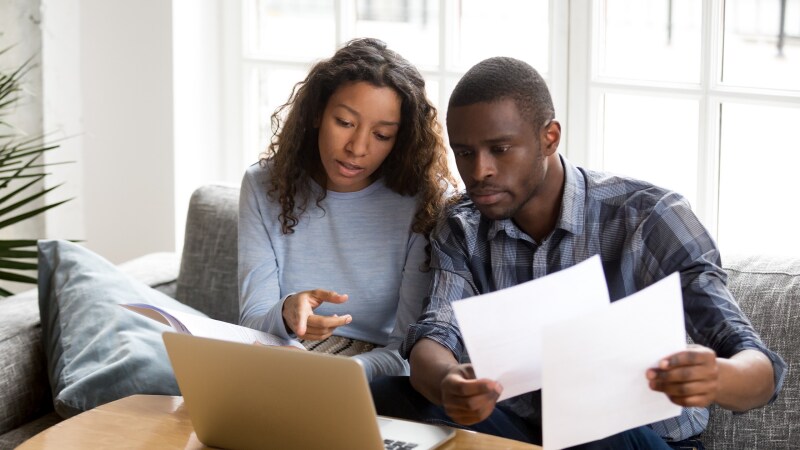Questions to ask your lender when buying a house

There are a lot of questions when it comes to buying a house. Does it fit your needs? Is it in a neighborhood you love? Can you afford it? Will it pass inspection? You're the only one who can decide if it's the right home for you. However, your lender can answer many other questions about the mortgage. Here are a few questions to ask your lender when buying a home:
Is the mortgage loan fixed-rate or adjustable?
A fixed-rate mortgage will generally last for up to 30 years. The interest rate will stay the same, and you'll know from the beginning how much your principal and interest payments will be.
With an adjustable-rate mortgageec-mortgage-arm, the interest rate may change over the course of your loan. Fluctuating rates impact your monthly payments.
Be sure to confirm whether your rate is adjustable or fixed so you can budget accordingly.
What is the interest rate?
Your lender can explain what l interest rate you'll pay on your loan. They'll also explain how your financial status and credit score affect that rate.
The interest rate impacts how much house you can afford. A higher interest rate means a higher monthly payment. Understanding how your rate affects your mortgage payments will help you calculate how much home you can afford.
How much down payment is needed?
Down payment options depend on the type of loan, the price of the house, your finances and your credit score. Some lenders prefer a down payment of 20% of the total purchase price, but you may be eligible to go as low as 3%low-down-payment-hl000052.
However, down payment requirements may vary depending on the type of loan and your credit history. Keep in mind that the more money you put down, the less interest you'll pay over the life of your loan.
Are there any down payment assistance programs that can help?
You or the home you're planning to buy may qualify for a local, state or national homebuying assistance program. These programs may be able to help with all or part of your down payment. Your lender can help you find appropriate programs and assist with the application process.
How much is the monthly mortgage payment?
Your mortgage payment always includes the principal on the loan plus interest. It may also include property taxes and homeowner's insurance if you pay these through an escrow account. Your mortgage payments are determined by the loan amount, the interest rate the loan's length and if taxes and insurance are included. Ask your lender to break down the mortgage payments to help you understand exactly what you'll need to budget for every month.
Are mortgage points available?
Buying mortgage points, sometimes called discount points, is a way to buy down your interest rate. Paying points lowers your interest rate and reduces your monthly mortgage payment. You'll want to discuss buying points with your lender, as this money could be used to increase your down payment or go towards repairs on the house.
How soon will closing take place?
Ask your lender how quickly you can close. Also, ask if on-time closings are guaranteed. This is especially important if you're renting and nearing the end of your lease or if you're selling your current home.
Will the rates be locked until closing?
A written lock-in agreement guarantees the rate on your mortgage for a period of time, generally 30 to 90 days. Taking this step protects you from rising interest rates while you're waiting to close on the home.
Rates could also drop, so locking in a rate is up to you. Speak to your lender about costs for locking in your rate, as well as costs for extending the lock should closing take longer than expected and if you can relock if rates go down.
What are the closing costs?
Closing costs are the final fees you'll pay before the mortgage can be finalized. Appraisal, origination or processing fees, title insurance and the Lender's attorney fees are some of the costs due at closing. When you make an offer on a home, talk with your realtor about asking the seller to pay a portion of your closing costs.
It's important to know the fees associated with closing ahead of time so you aren't caught off guard. After you apply your lender will provide you with a Loan Estimate listing the costs.
What do I need to bring to closing?
Your lender will let you know everything you need to bring to closing. Most lenders require a photo ID, proof of homeowner's insurance and any remaining loan conditions. You'll also need to bring a cashier's check or proof of wire transfer for the amount due at closing
Do I need homeowner's insurance?
Lenders require proof that a home is, or will be, adequately insured.
Homeowner's insurance covers damage or loss of your home and personal possessions from things like fire, storms, theft and vandalism. General liability coverage also protects you in case someone is injured while on your property.
It's important to note is that most homeowner's insurance doesn't cover flood damage. If your home lies in a flood plain or may suffer damage from heavy rains, flash flooding or mudflows, you may also be required to have separate flood insurance.
Speak to your lender about the coverage you'll need, when you'll need it and how to prove you have it.
What are the property taxes?
Property or real estate taxes are one of the costs of owning a home. Your local government sets the tax rate which covers municipal (or county) services that benefit the community. Property taxes can vary greatly. Ask your realtor or lender how much your property taxes will be.
Do I need an escrow account for taxes and insurance?
If you're new to homeownership, you may be shocked when you receive your first property tax or home insurance bill. You may need to set up an escrow account with your lender in order to spread these payments out. You'll pay a portion of the taxes and insurance with each mortgage payment. That money is held in an escrow account until the taxes and insurance bills are due, then paid from your escrow account so you don't have to come up with the full amount at once. Ask your lender if you have the option to pay these bills on your own or if your loan requires it be escrowed through the lender.
Can I make additional payments?
If you're planning to make additional payments towards your mortgage in future, ask your lender if there are any fees or prepayment penalties. Your lender can take you through any and all fees that could be associated with extra mortgage payments.
What additional fees do I need to be aware of?
Always ask your lender what other fees to expect. For example, you may be asked to pay for a property survey, a title search or recording the deed at your county recorder's office. Some lenders charge an origination fee to process your loan.
Ask your lender to explain these and any other costs and whether they apply to your home loan. Some fees are optional, and others may be negotiable. Knowing what to budget for can help make navigating the homebuying process easier.
Rely on your team of mortgage professionals
These homebuying professionals include your real estate agent, Home Lending Advisor (HLA), home inspector, appraiser and others. Together, they will help you find and buy your new home.
Your real estate agent
This professional will be with you every step of the way, from seeing the first house all the way to closing. Choose a real estate agent with a good reputation and that you personally like. You'll be spending a lot of time together throughout the homebuying process.
What to expect from your real estate agent:
- They'll help you clarify what you want and need in a home. Then they'll show you homes that meet those needs.
- They know about the schools, nearby grocery stores and neighborhood parks. They can also offer insights into a neighborhood's family-friendliness, general safety, ease of commuting and other important considerations.
- They can help you understand why homes are priced a certain way. They'll also help you prepare an offer that has the best chance of being accepted.
Your Home Lending Advisor
Your Home Lending Advisor will consider your financial picture and assist in finding the type of loan that meets your needs, then help get you preapproved for that loan. Your HLA will be with you throughout the loan application process, from preapproval to closing.
Your home inspector
The home inspector will do a thorough inspection of your potential new home. Their job is to ensure it's structurally sound and provide you with a list of any minor or major repairs.
An appraiser
While you don't select the appraiser, they are an important part of the homebuying process. This expert looks at the home's size and condition, then compares it to similar homes in the neighborhood that have recently sold. They'll come up with an estimated value for the home you're planning to buy.
Other members of your homebuying team
- A loan processor verifies the information on your loan application.
- An underwriter reviews your credit and finances to decide if your loan application is able to be approved by the lender.
- You may want a real estate lawyer to review your purchase agreement and represent you at closing.
- A tax advisor can help you understand the potential tax benefits of owning a home.
Ask your lender about anything you don't understand
It's important to ask questions throughout the homebuying process. After all, a home is a big purchase.
Knowing what questions to ask will help you navigate the homebuying journey with more confidence. You can also read through mortgage FAQs or our mortgage dictionary to help you prepare.



